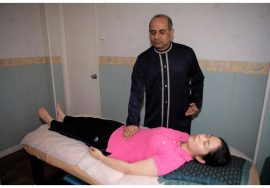
AYURVEDA FOR FERTILITY AND PROCREATION – SEX AND INTIMACY
How can Ayurveda help to make intimate relationship/sex more satisfying?
Before discussing this topic, let us first understand :
- what Ayurveda says about “sex” itself
- how individuals with a specific Prakruti (body-mind constitution) interact in their intimate relationships with others.
Ayurveda says that “Sex” is the third sub-pillar, after Food and Sleep, which helps to sustain the body structure and maintain good health. Ayurveda says that sex in the form of “love” is divine, which helps the creation to continue; and when it is perverted to “lust” then it is a sin.
In ancient times, this subject was openly taught to everyone in a very scientific way, at a very young age (puberty), to help them understand and handle the changes they would experience at the biological/physical, emotional and mental levels, due to the hormonal changes happening within their bodies at that age. Due to a sensible and scientific approach with regard to sex education, there were not so many unpleasant incidents in society.
In many communities around the world, especially in many Asian communities, it is taboo to talk about “sex” during normal social gatherings, particularly in the presence of young children, although the situation is changing rapidly due to the easy access to various sources through the internet, where so much information is available on this subject.
Another thing we need to learn and understand is – how individuals with a specific Prakruti (body-mind constitution) interact in their sexual relationships with others.
To keep this article very precise and to the point, we will only discuss how individuals from the three main constitutional body types (doshas), i.e. Vata (air predominant), Pitta (fire predominant) and Kapha (water as the primary element and earth as the secondary element), interact with other body types. Bearing in mind that each individual is a combination of all the three doshas, and for our easy understanding, we are focusing on the predominant/main dosha of an individual.
Vata (air) individuals – People with a predominantly Vata dosha are generally communicative, expressive, sensitive, inconsistent, feel excited fairly easily and lose interest quite quickly as well. They generally like to touch others to feel connected, but generally do not like to be touched/hugged by others due to “wanting their own space”. Their stamina is not much, therefore, they prefer to enjoy emotional sharing by having discussions with their partners rather than engaging in actual physical intercourse. They can be satisfied/happy with a lesser frequency of physical intimacy. Due to their sensitive nature, they have a tendency to feel hurt very easily, and therefore they can walk away from any relationship impulsively, although later on, they may regret doing so.
Pitta (fire) individuals: Pitta oriented individuals are very passionate about their romance and relationships. Due to their leadership qualities, ability to make quick and firm decisions, ability to motivate other people and making them feel secure, taking risks, disciplined behaviour, and radiant and healthy looks – just to name a few qualities; they attract the attention of the opposite sex very easily and they can be excellent partners. Pitta individuals take their relationships very seriously and they believe in long term relationships. Strong Pitta gives them strong sexual appetite and their stamina is also high. They expect and enjoy having sexual intimacy very often. They value their relationships and are very protective by nature. This quality of Pitta individuals makes other people feel very secure in their company.
Kapha (water + earth) individuals: Kapha predominant individuals are very caring, loving, patient, soft spoken, calm, tolerant, affectionate and like to be hugged. Their sexual appetite is very strong but they do not express their needs openly and can be somewhat passive. Due to the strong influence of Kapha, they do not feel aroused/ excited so easily – they need more time to get excited/aroused, and they also take a long time to feel satisfied. As they are unable to experience satisfaction so easily, they want to indulge in sexual activities very often.
The above points give you an idea with regard to the constitutional needs/wants of individuals with different “Prakruti” (mind-body constitution). In our next article we will discuss how individuals with different mind-body types interact sexually with their partners who have their own specific mind-body constitution.
To book an online appointment at Ayuryoga, with our Ayurveda/Yoga Expert Mr. Vinod Sharma Hong Kong please click here.
DISCLAIMER : This information is intended for educational purposes only & does not constitute expert medical advice, nor is it meant to replace medical recommendations by a medical practitioner. Always consult a qualified Ayurveda Doctor/Health Professional/Yoga Guru for your specific medical needs before taking any herbal health supplements, and/or practicing Ayurveda & Yoga.












